Food banks are no longer serving just the homeless
During an evening at the Rainham Foodbank, James Moore discovers that more and more Brits are finding themselves below the poverty line

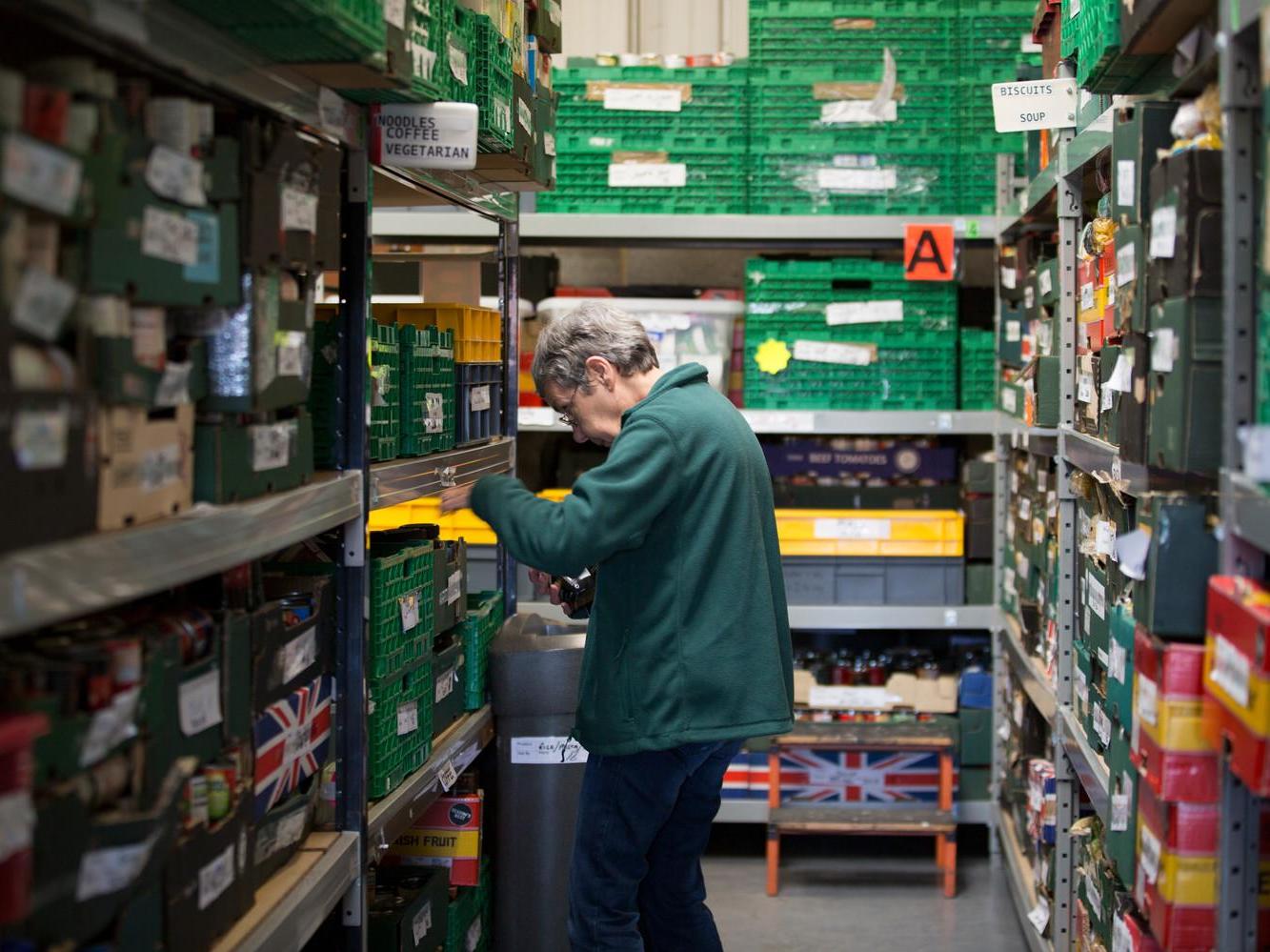
Blossom’s story is a scary one. It shows just how easy it can be to get caught in the vice-like jaws of Britain’s poverty trap. A dental practice manager by trade, she’s the sort of person who you might imagine would pick her groceries up from, say, Sainsbury’s. Instead, she’s getting them from the Rainham Foodbank, part of the Trussell Trust’s 1,200-strong network that was set up with the aim of providing emergency assistance to those without enough money to eat in what remains one of the world’s richest countries.
That trap is one that ensnares more and more people every year. There are already 14 million people in it. Some 4.5 million of them are children. “I’ve got no money to spend on food,” Blossom tells me when we sit down together. She’s brought a friend with her to help her get a box full of much-needed provisions home. The trust provides the people who have been referred to its network with a minimum of three days worth of provisions. “When everything else is accounted for there’s nothing left. Zero,” Blossom says.
Blossom, not her real name, has had it tough. A bout of chickenpox while pregnant with her son left him with health issues, preventing her from working full time. When her daughter left home, her income took a severe hit through the loss of benefits and tax credits. Struggling with rent arrears, the benefits system and mental health issues (hardly surprising given her situation) that currently prevent her from working at her part-time job, she found herself in a desperate situation. A referral to the food bank followed.
The matter of fact way she talks about a crushing situation is impressive. But there is one question she struggles with during our conversation: What would she have done had the food bank not been there? “I don’t want to answer that,” she replies. I see her shudder.
Blossom is one of the people I meet after arranging with the trust to spend an evening at a typical food bank. If these institutions were businesses they would be among the UK’s fastest-growing. In the past year, they have delivered a staggering 1.6 million emergency food parcels, more than half a million of which went to children (up 19 per cent). The trust says that the past five years have witnessed a 73 per cent increase. This is an organisation that campaigns for its own demise: it wants to see an end to hunger in Britain and, thus, no more need for its work. Figures like that make it clear that its network will be with us for a long time to come. It will be necessary. There are millions of Blossoms walking on flimsy floorboards with the trap just beneath their feet.
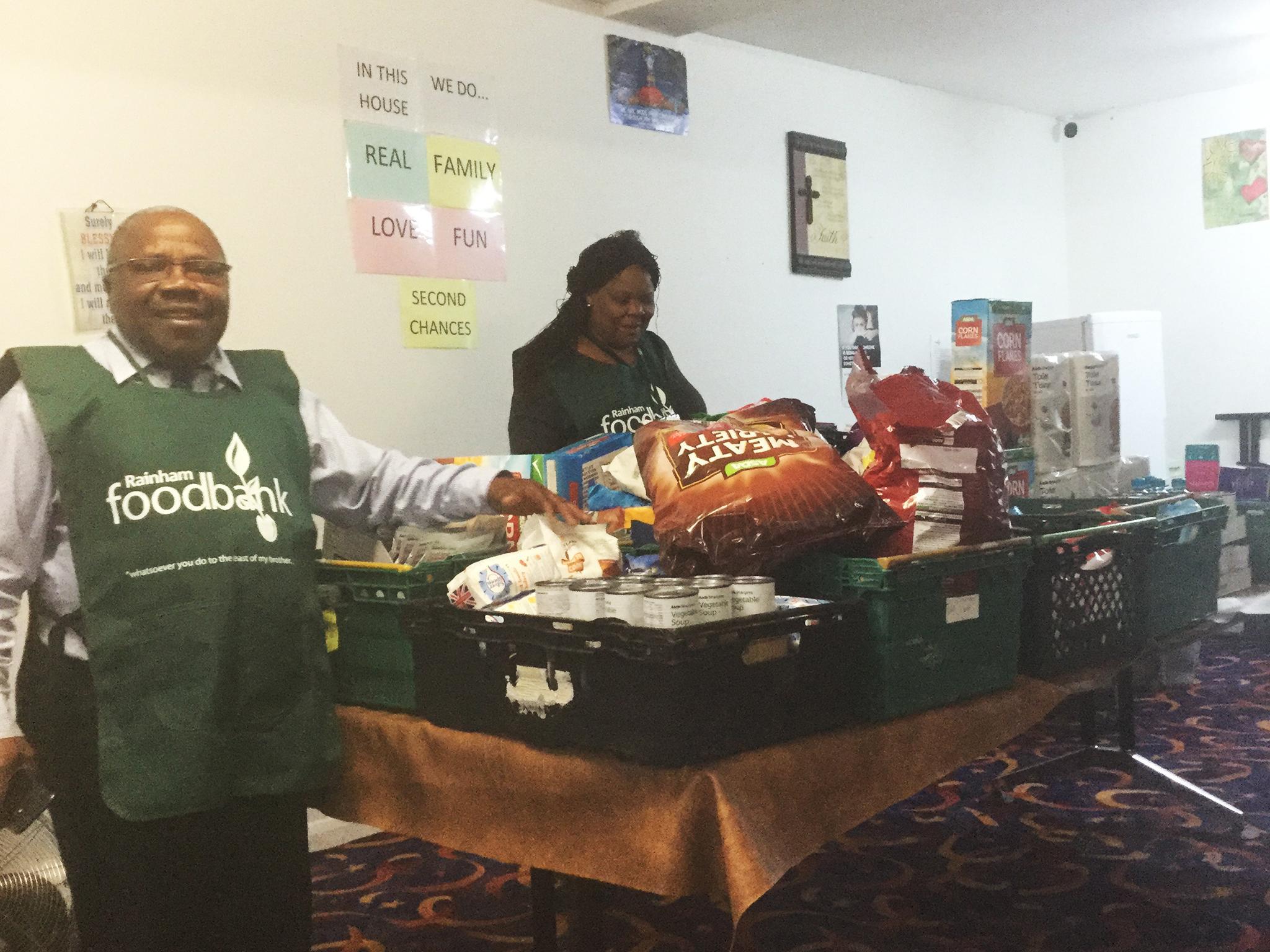
Emma Revie, the trust’s chief executive, says: “What we are seeing year upon year is more and more people struggling to eat because they simply cannot afford food. This is not right. “As a nation, we expect no one should be left hungry or destitute – illness, disability, family breakdown or the loss of a job could happen to any of us, and we owe it to each other to make sure sufficient financial support is in place when we need it most.
“But right now, benefits cuts, freezes, and the five-week wait for universal credit are the main reasons why food banks in our network distributed a record number of emergency food parcels in the last year. In the world’s fifth largest economy this is nothing short of horrifying.”
“Universal credit” is a phrase that regularly crops up in conversations I have with volunteers and clients at the food bank. The delay was ostensibly to help people budget. Most workers are paid in arrears. Critics suspect more cynical motivations on the part of the Conservative-led government that introduced it. It bears repeating that many people on low incomes get paid weekly in arrears, not monthly. Revie says reducing the wait for payment would be a major step towards easing the pressure “on thousands of households”.
Mental health problems are also regularly mentioned during my visit, on a typical autumn evening at the beginning of the week. Other disabilities, illness, family breakdown and the loss of a job are other contributors to food banks’ growth.
Illness, disability, family breakdown or the loss of a job could happen to any of us
Rainham’s is based just off the A13, one of London’s major arteries, on the sort of street that’s not an uncommon in this part of the world, with an untidy mix of business premises, modern flats and older housing making it look as if planners have tried to ram together the pieces from several different jigsaws. It moved to its current home from a local community centre. Aloysius Peter, the pastor who founded it, says he and some of his parishioners had to dip into their own pockets to secure the place. It’s slated for redevelopment, but mercifully a new home has been found.
It soon becomes clear that calling it a “food bank” is a bit of misnomer. It is actually more of a provisions, support and advice bank. Chairs and tables are set out. Coffee and tea are handed out. Volunteers and clients sit talking quietly. But it’s not just sympathy provided with the tea. “We aim to get people back on their feet,” the pastor, an energetic man with the sort of presence you would expect someone occupying his position to have. He believes it is his religious duty to “feed the hungry”. Not all of the volunteers are motivated by faith. But the moral imperative is common to all of them.
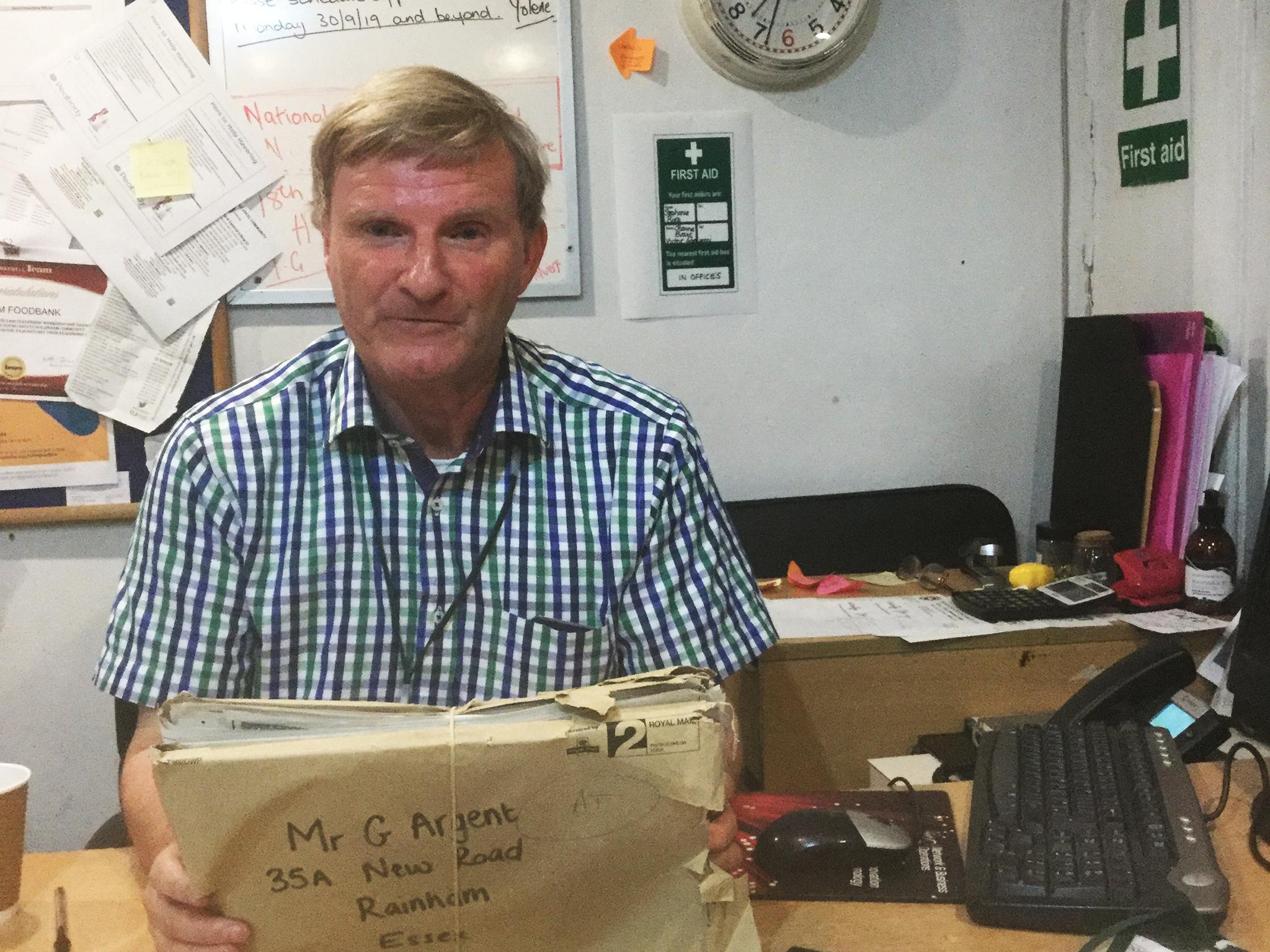
Julie Lawson is one of the place’s success stories. The first thing you notice about her is her shocking pink hair and punk rock style. The second is her smile. She is one of the volunteers that the bank relies upon. She became one after first being a client. “I came out of prison on a tag,” she says. “I was completely new to the area. I figured it was near to where I used to live, in Crawley. It’s a little bit further than I thought. I didn’t have no money. Just the £30 they give you, so I didn’t have nothing to eat. They’re not very good in these hostels. You get your room and they check on you once a week to make sure you paid your rent. That’s it.”
I’d have probably ended up back in prison because I’d have had to go and shoplift to get something to eat
Faced with a wait for benefits, a situation not uncommon with ex-offenders, Lawson found herself in a bind. A catch-22 situation. When I ask her the same question I asked Blossom, she is candid: “I’d have probably ended up back in prison because I’d have had to go and shoplift to get something to eat. I didn’t know anyone in the area. So I’d have either gone without – and there’s not much of me as you can see – or I’d have gone and pinched a sandwich. And I’d have been back to square one. Back in prison again.” That would have been a tragic waste. It costs £37,543 to keep someone behind bars, according to the House of Commons library. To put that in context, the average UK wage is £29,009.
Lawson can’t hold down a job. She is bipolar. However, as a volunteer, she is able to make herself useful. And she’s a hard and energetic worker, who is also occasionally drafted in to help with the administration of the place too. She is also, having had drug problems in the past, clean. It is she who gives me the tour of the place, showing me the stocks of food, arranged neatly in pallets, explaining where it comes from. Shoppers donate when they pick up their groceries. The major supermarkets also chip in. End of line stock, products they can’t sell because of damaged boxes, for example. It’s not just food. The bank also stocks toiletries, sanitary products, nappies. Everything, in other words, that most people would take for granted.
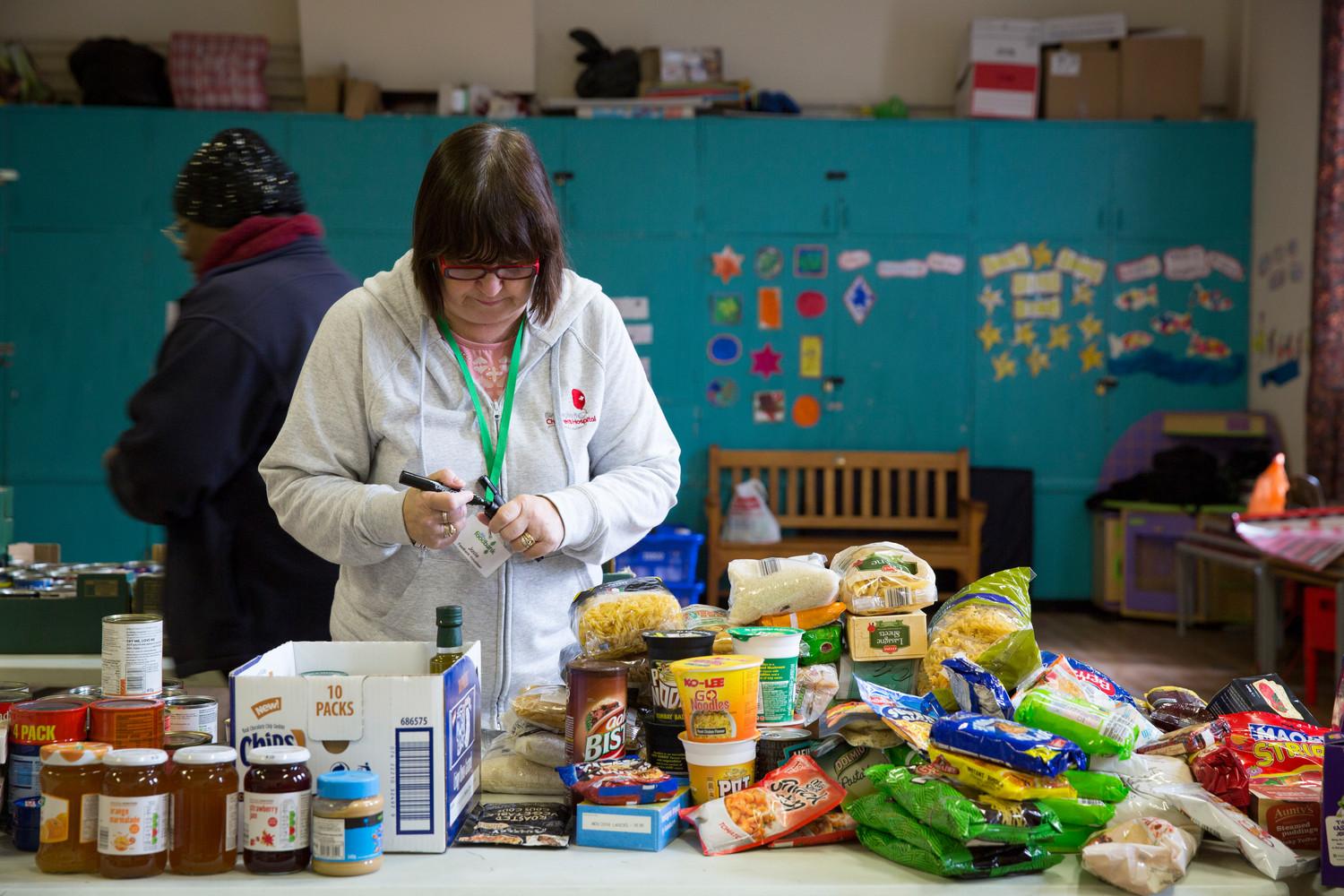
Food banks like the one at Rainham have been left to pick up the pieces where the state, and the economy, have failed. Peter says low wages are a major issue clients regularly encounter. The trust’s banks often have to provide food aid to working people with jobs that simply don’t provide enough for them to make ends meet.
Revie calls on employers to pay the real living wage, which is voluntary and overseen by the Living Wage Foundation, to address that issue. It stands at £9 an hour in most of the UK but £10.55 in London, to reflect the capital’s higher cost of living. It is set based on what a worker needs to be able to afford a decent basic standard of living. The government’s National Living Wage, by contrast, is £8.21 an hour. She also says benefit payments should be increased to reflect the true cost of living. They have fallen in real terms as a result of the government’s austerity policies. The notion, promulgated by some on the right, that people take advantage of other people’s generosity by misusing food banks simply isn’t true. Those who use the Rainham Food Bank, or others in its network, first have to be referred to it. Headteachers, doctors, social workers, are among those who can do that.
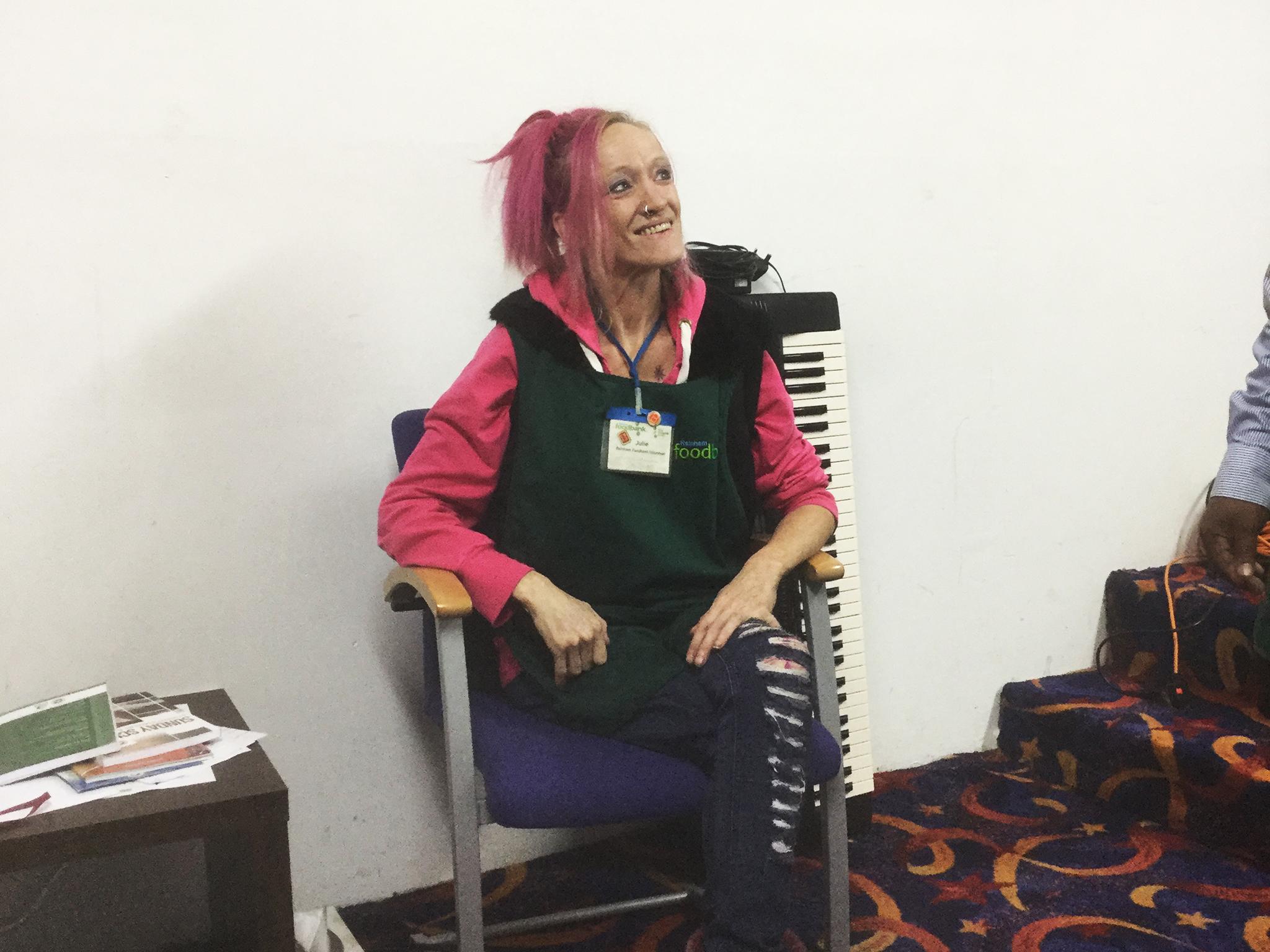
After they have picked up provisions, users often end up in the office of George Argent, who is on hand to advise them on finding ways out of their predicaments. Sometimes that might mean referring them to the right agency, if, for example, they need help with debts or with housing. But when it comes to benefits, and the bugbear of universal credit, he’s an expert. Now retired, wearing a shirt and with neatly brushed sandy hair, he doesn’t look like the sort of person who would be storming the barricades of the Department for Work and Pensions. But it has good reason to fear him.
His weapon is his pen. Didn’t someone once say that’s mightier than the sword? It is when it comes to Argent. He boasts a 100 per cent record when representing disabled people appealing adverse personal independence payment decisions at tribunals, for example. “Their tactic is to swamp people with paperwork. But I like paperwork,” he says. That’s the sort of statement that would make many government employees shiver. “A lot of what I do is to help people with the forms,” he explains. “The system is very difficult and they’ll never let you get through to one of the decision-makers on the phone. I’ve tried.”
How could the situation be improved? “That’s a very good question,” says Argent. “I don’t think there’s an easy answer.” Money would, however, clearly help. Better wages. An end to the benefits freeze. And perhaps an injection of humanity into a vast and bureaucratic system that bludgeons the people it is supposed to serve, and that takes up hours of Argent’s time. People like him, who are willing to devote their time to chipping away with letters, and emails, and appeals, at institutions like the food bank have become Britain’s fourth emergency service.
Having had to call upon it, Lawson has now found a place that offers a sense of community. Watching the volunteers at work there shows that there are pockets of something better lurking underneath the hard face Britain and its lamentable leaders have been presenting to the world of late. But take her story, or Blossom’s, or any of the others its clients could tell you. Spread them across Britain. Then ask what the consequences if the trust didn’t exist. It’s not a comfortable thought. It’s not a question you really want to answer.
Join our commenting forum
Join thought-provoking conversations, follow other Independent readers and see their replies
Comments